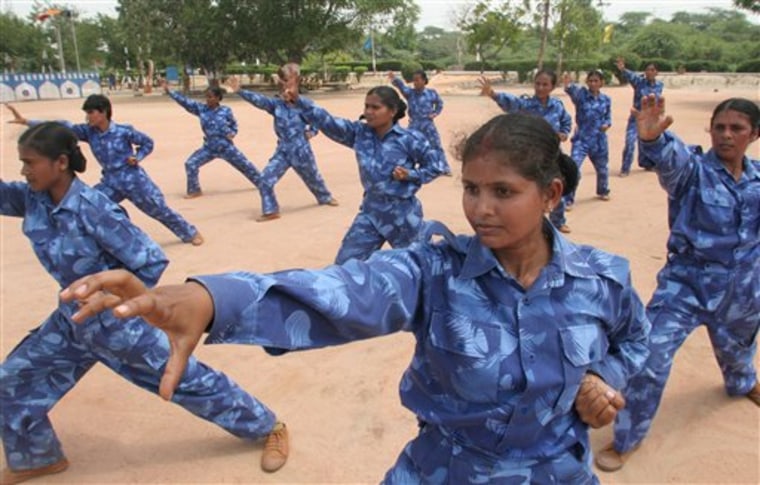They have served in some of India's most dangerous hot spots, facing down rioters and armed insurgents.
Now, 125 Indian policewomen are being trained to form an all-female team of United Nations peacekeepers — its first such peacekeeping group — to help bring order to Liberia, a west African nation rebuilding after nearly a quarter-century of conflict.
"The situation in Liberia is extremely volatile, but we believe our experience in handling difficult situations in India will come in handy," said Seema Dhundia, the 39-year-old unit commandant, as she put her soldiers through their paces Thursday in a dusty field in northern New Delhi.
India has been a major contributor to U.N. peacekeeping missions for decades and has sent women as part of earlier contingents. But Indian officials felt it was time for a female-only unit, picking candidates from the country's paramilitary Central Reserve Police Force. The unit expects to deploy to Liberia by mid-October.
"Women police are crucial in crisis situations, since most of the victims of strife are women," said Kiran Bedi, a senior Indian police official who has served as a U.N. adviser, and who helped initiate the peacekeeping plan. "India is one of those rare countries which has a large contingent of trained women serving in specialized units that have experience in conflicts, riots and civil strife."
Female peacekeepers, said Dhundia, bring something different to conflict zones.
'Just as tough as men'
"Women police are seen to be much less threatening, although they can be just as tough as men. But in a conflict situation, they are more approachable and it makes women and children feel safer," she said.
All the peacekeepers have battled insurgencies in India's own trouble spots — Islamic militants in Kashmir, separatist guerrillas in the tropical jungles of the northeast, Maoist rebels in central India.
"These soldiers have been hand-picked from hundreds of applicants after stringent physical and mental tests," said Dhundia.
They are now in an intensive six-week training program, working under veterans of earlier peacekeeping operations. At a shouted command during Thursday's session, the women, dressed in blue battle fatigues, fell to the ground and took aim at distant targets; at another command, they set aside their weapons to display their prowess in hand-to-hand combat.
"Given the situation on the ground in Liberia, our training includes civil disorder management, handling crowds, the levels of force to be employed and use of non-lethal and lethal weapons," said Poonam Gupta, a 10-year veteran of the Central Reserve Police Force.
Although battle-scarred, few have worked abroad before.
"Yes, there are apprehensions about the situation we will face. But we are soldiers first. This is part of our training. Once we don the uniform, all our fears disappear," said Lalitha Kaloni.
Kaloni, whose father fought in Europe with the Allied forces during World War II, said her family was thrilled when she was selected for the Liberia mission. "There were no fears. My parents encouraged me, saying a soldier fights for her country anywhere, anytime."
Despite the aura of bravado, many are leaving families behind and admit to occasional moments of anxiety. The soldiers are hoping phone calls from their base in the Liberian capital, Monrovia, will ease the homesickness.
Yoga, meditation for stress relief
They are also being given lessons in yoga and meditation to deal with the stress they will face, said Dhundia.
Eventually, they are likely to be called on to train Liberia's national police, help conduct local elections or assist with prison security as the West African country struggles to return to normalcy.
About 200,000 Liberians are believed to have been killed in the 1989-2003 civil war, which also displaced half the country's 3 million people. The country — founded by freed American slaves in 1847 — is still struggling to recover.
Some 15,000 U.N. peacekeepers are providing security in Liberia under a 2003 peace deal that ended fighting.
